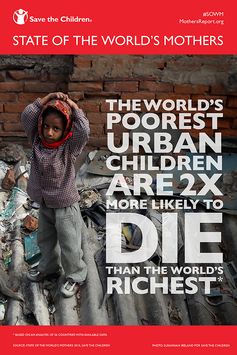The Save the Children organization recently released its yearly publication, State of the World’s Mothers, which addresses health problems facing children worldwide. The report ranks the United States 61st in the world for maternal health, and 42nd in the world for children’s health, far behind other countries at the same level of economic development. Furthermore, among 25 capital cities of countries at the same level of economic development as the United States, Washington, D.C., has the highest rate of infant mortality.
Infant mortality in the District and how it can be reduced was the topic of a panel discussion held May 5 at the Town Hall Education Arts Recreation Campus (THEARC) to mark the release of the Save the Children report. The panel members were Dr. Kurt Newman, CEO of Children’s National Medical Center, Washington, D.C.; Dr. Djinge Lindsay, deputy director of programs, D.C. Department of Health; Dr. Marcee White, medical director of the Children’s Health Center and mobile health programs at THEARC facility in ward 8; and Dr. Bina Valsangkar, Save the Children technical advisor on newborn health.
Panel members discussed sobering realities facing low-income families in Washington. In the District’s Ward 8, half of all children live below the poverty line; children in Ward 8 are ten times more likely to die in infancy than children in Ward 3, the richest section of the district.
While many of the experts on the panel addressed specific health problems such as ties between obesity and infant death, during their discussion it became clear that a holistic approach is needed to address the realities facing mothers with few resources.
Mothers with unstable family relationships may find themselves without the support systems they need, and sometimes this creates what Dr. Marcee White of the Children’s National Medical Center described as “toxic stress.” Toxic stress may result when there are problems that cannot be readily solved because of a lack of resources.
Dr. White described an economically stressed mother who continued smoking cigarettes despite having three children with asthma. The mother understood that smoking affected not only her own health, but the health of her children, but she saw smoking as her only respite from the constant stress of parenting without a support system. According to Dr. White, this mother “simply could not bring herself to give up the one moment in her day that she had to herself.” In this case, the mother’s stress was toxic to her children.
To understand what is currently available for mothers in the District of Columbia who lack a support system and are experiencing extreme economic hardship, Street Sense reached out to Lakita Williams, the Patient Services Manager at Community of Hope’s Family Health and Birth Center in northeast D.C. Williams works with mothers in D.C. to provide prenatal care, support systems, and resource coordination. Many of the low-income mothers that she has been working with do not have the kind of secure housing most District residents take for granted.
A big stressor, she says, comes from “not knowing you have support, not knowing where to lay your head.”
Lakita Williams spoke about the Family Health and Birth Center’s approach to care and support for mothers. Mothers can attend group meetings and may have individual appointments with midwives and facilitators; such meetings cover a wide range of topics including comfort measures, sleep safety, natural birth, breastfeeding, and nutrition.
A very important benefit of the group meetings is the supportive environment they provide. At those meetings, more experienced mothers help new mothers process unfamiliar information. Williams described the meetings as a place where “the moms can actually hear about it, sit down and talk through the process.”
Another resource available to low income mothers is the Strong Start program, which is a comprehensive support program that puts mothers in contact with other resources after a child’s birth. Williams said that specialists sit down with the new mothers to say “Let’s put a plan together for what’s going to happen.”
Williams reports that some mothers “have never heard before what their journey’s going to be like. They say, ‘I’ve never had this before, thank you.’”
In “helping to talk through these barriers,” the Family Health and Birth Center provides a comprehensive support system for mothers who need access to education and resources. Working with low-income mothers to provide for the health of their children may help to lower the outsize infant mortality rate in poor neighborhoods in D.C.
This kind of care is epitomized in the work that Williams does, which in group meetings extends beyond medical care to creating a full support system.
One example of this support that many mothers working in the program have enjoyed is belly casting. Williams described the process as making a “cast of the moment of pregnancy and your baby, something to keep, something that the moms come to decorate at the next meeting.”
In providing support for mothers, Williams also wants to ensure happiness and positivity for these mothers who are often worried about what will come next. By preserving this moment of pregnancy as a positive memory, mothers are able to relax, if only just a little bit. Williams finished up her comments by stating the importance of “helping mothers talk through these barriers.”
The Save the Children report endorsed further funding of prenatal care organizations and ensuring healthcare for all women of childbearing age.
Source: http://www.savethechildren.org/atf/cf/%7B9def2ebe-10ae-432c-9bd0-df91d2eba74a%7D/SOWM_2015.PDF








